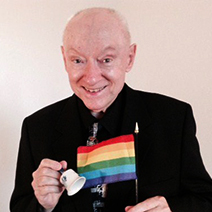Ira Lee Collings: Simply, Ira Lee
Ira Lee Collings
Simply, Ira Lee
(A Gay Geezer Celebration Through the Looking Glass…Warts and All)
Don’t Tell Mama, NYC, June 15, 2016
Reviewed by Joel Benjamin for Cabaret Scenes

Photo: Sheree Sano
Pleasant is the word that came to mind during Ira Lee Collings’ Simply, Ira Lee (A Gay Geezer Celebration) at Don’t Tell Mama. It was a genteel, practically irony- and pain-free program of decently sung classics that told the tale of an Indiana native, the youngest of eight children, who grew up before Gay Lib, yet managed to have a string of lovers and a minor career in show business.
Collings has a pleasant, thin voice that often expanded in surprising ways as he got into a song. “Put on a Happy Face” (Charles Strouse/Lee Adams) was an apt opening number, followed by a wistful, yet hopeful, “Here’s to Life” (Phyllis Molinary/Artie Butler).
His first romantic experience, while performing in a local theatrical troupe, was illuminated with “I’m Beginning to See the Light” (Duke Ellington/Don George/Johnny Hodges/Harry James), while a move to Chicago left him confused: “Who Are You Now?” (Jule Styne/Bob Merrill). A song written for the Judy Garland film A Star Is Born, “Lose That Long Face” (Harold Arlen/Ira Gershwin), followed by “A Resting Place” (Richard Lescsak) and “A Lot of Livin’ to Do” (Strouse/Adams), described an arc of his life that took him from menial jobs to winning a talent contest.
A quiet “At Last” (Harry Warren/Mack Gordon) and a buoyant “Just in Time” (Styne/Comden & Green) signaled an uptick in his romantic and professional life.
Finally, he met the love of his life with whom he has lived for over thirty years. A very sweet “He Touched Me” (Milton Schafer/Ira Levin), a moving “Come In from the Rain” (Carole Bayer Sager/Melissa Manchester) and a triumphant “Nothing Can Stop Me Now” (Leslie Bricusse/Anthony Newley) told of his contentment. “There’s a Small Hotel” (Rodgers & Hart) was a sing-along finale.
Although his tale might have had deeper pathos and might have been more revealing of what it was really like to be gay in mid-century U.S.A, there was enough heartfelt storytelling to keep his act grounded.
John M. Cook was his good-natured accompanist and musical director. His piano playing was terrific.
Category: Cabaret Reviews, New York City, New York City Cabaret Reviews, Regional






